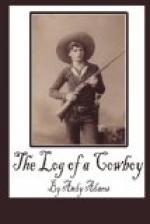As they rode away to relieve the first guard, McCann said, “Isn’t he a muzzle-loading daisy? If I loved a liar I’d hug that man to death.”
The absence of our foreman made no difference. We all knew our places on guard. Experience told us there would be no trouble that night. After Wyatt Roundtree and Moss Strayhorn had made down their bed and got into it, Wyatt remarked,—
“Did you ever notice, old sidey, how hard this ground is?”
“Oh, yes,” said Moss, as he turned over, hunting for a soft spot, “it is hard, but we’ll forget all that when this trip ends. Brother, dear, just think of those long slings with red cherries floating around in them that we’ll be drinking, and picture us smoking cigars in a blaze. That thought alone ought to make a hard bed both soft and warm. Then to think we’ll ride all the way home on the cars.”
McCann banked his fire, and the first guard, Wheat, Stallings, and Borrowstone, rode in from the herd, all singing an old chorus that had been composed, with little regard for music or sense, about a hotel where they had stopped the year before:—
“Sure it’s
one cent for coffee and two cents for bread,
Three for a steak and
five for a bed,
Sea breeze from the
gutter wafts a salt water smell,
To the festive cowboy
in the Southwestern hotel.”
CHAPTER X
“NO MAN’S LAND”
Flood overtook us the next morning, and as a number of us gathered round him to hear the news, told us of a letter that Mann had got at Doan’s, stating that the first herd to pass Camp Supply had been harassed by Indians. The “Running W” people, Mann’s employers, had a representative at Dodge, who was authority for the statement. Flood had read the letter, which intimated that an appeal would be made to the government to send troops from either Camp Supply or Fort Sill to give trail herds a safe escort in passing the western border of this Indian reservation. The letter, therefore, admonished Mann, if he thought the Indians would give any trouble, to go up the south side of Red River as far as the Pan-handle of Texas, and then turn north to the government trail at Fort Elliot.
“I told Mann,” said our foreman, “that before I’d take one step backward, or go off on a wild goose chase through that Pan-handle country, I’d go back home and start over next year on the Chisholm trail. It’s the easiest thing in the world for some big auger to sit in a hotel somewhere and direct the management of a herd. I don’t look for no soldiers to furnish an escort; it would take the government six months to get a move on her, even in an emergency. I left Billy Mann in a quandary; he doesn’t know what to do. That big auger at Dodge is troubling him, for if he don’t act on his advice, and loses cattle as the result—well, he’ll never boss any more herds for King and Kennedy. So, boys, if we’re ever to see the Blackfoot Agency, there’s but one course for us to take, and that’s straight ahead. As old Oliver Loving, the first Texas cowman that ever drove a herd, used to say, ‘Never borrow trouble, or cross a river before you reach it.’ So when the cattle are through grazing, let them hit the trail north. It’s entirely too late for us to veer away from any Indians.”




